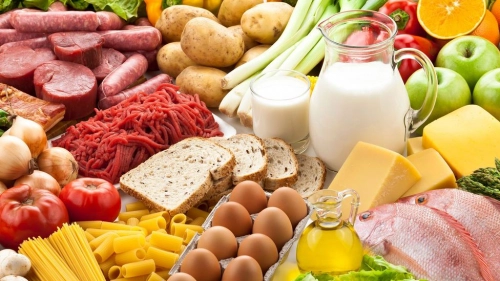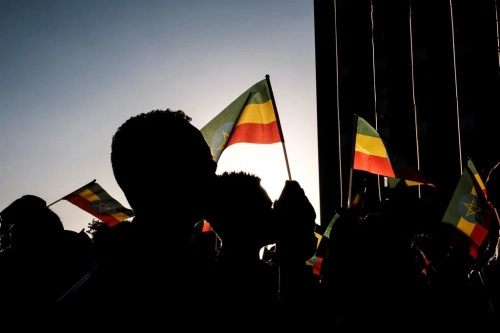profile/3321IMG_20211111_054628_949.jpg.webp
Eric123

HOW TO USE FOOD TO BOOST YOUR IMMUNE SYSTEM.
~5.8 mins read
How to use food to boost your immune system
Want to fight off infectious diseases this winter? Consider boosting your immune system with nutritious food.
Mediterranean diet named best diet for 2021
"What we eat is very important in terms of how our immune system responds to pathogens and how well it can defend itself against a pathogen," said Dr. Simin Meydani, senior scientist and leader of the nutritional immunology team at Tufts University's Jean Mayer USDA Human Nutrition Research Center on Aging.
Micronutrients such as vitamin C, vitamin D, vitamin B complex, zinc and selenium can help "pump up" the body's defenses against colds, flu and even Covid-19, Meydani said, but you won't boost immunity by "eating a large amount of one single nutrient or food component."
Forget focusing on "superfoods." A large variety of foods are needed to provide the micronutrients the body needs to mount a robust cellular immune response, said Stanford School of Medicine nutrition scientist Christopher Gardner.
"There isn't any one food or nutrient to rely on here, but rather it is the interplay of 'harmonious interactions' between the various micronutrients," Gardner said.
Plan your daily menus around a large variety of fresh and colorful red, yellow, orange, blue and green fruits and vegetables, along with some high-quality whole grains, a bit of lean protein and a splash of healthy oils.
Plants and grains are also the basis of the top-rated Mediterranean diet and DASH diet, which stands for "dietary approaches to stop hypertension," or high blood pressure. Both the Mediterranean and DASH diets avoid processed foods and focus on fruits, vegetables, beans, lentils, whole grains, nuts and seeds.
The Mediterranean diet can reduce the risk for high cholesterol, dementia, memory loss, depression and breast cancer, numerous studies found. Meals from the sunny Mediterranean region have also been linked to stronger bones, a healthier heart and longer life. Oh, and it helps with weight loss, too.
Sign up for CNN's Eat, But Better: Mediterranean Style. Our eight-part guide shows you a delicious expert-backed eating lifestyle that will boost your health for life
Just how much you can jump-start immunity with nutrients depends on your age, overall health and stress levels, according to Meydani.
In addition to eating well, it's important to stay at a healthy weight, reduce your stress, get quality sleep and regular exercise to keep those natural defenses in fighting shape. Without that healthy baseline, your body will have to work harder to knock out invaders -- and may even lose the match.
"The best defense against the acute threat of the coronavirus is chronically good health," said Dr. David Katz, founder and president of the True Health Initiative, a nonprofit dedicated to promoting evidence-based lifestyle medicine.
"If you encounter the virus a week from now, two weeks from now, three weeks from now, there is a chance you will do better because of what you do with your diet right now," he said.
Pump up the volume
If you want to maximize the impact of food on your immune system, you'll need to dramatically increase the amount of fruits and vegetables you eat each day, Meydani advised.
Mediterranean diet: How to start (and stay on) one of the world's healthiest diets
Her team investigated immune responses in animals fed two to three servings of fruits and veggies a day, and compared them to those who ate five to six servings a day or eight to nine servings a day.
"The eight to nine servings a day was where we were seeing the best effect," Meydani said. "So it's not just increasing the intake by a little bit, you've got to increase it substantially. People need to work at it in order to reach that level."
Finding ways to insert fruits and veggies into every meal and snack during the day may do more than pump up your immunity. A 2017 study found a significant reduction in the risk of heart attack, stroke, cancer and early death by eating 10 portions of fruit and vegetables each day.
Incorporating fruits and vegetables in meals and snacks throughout the day can help boost your immunity.
Current dietary guidelines in the United States recommend at least 2 cups of fruit and 2.5 cups of vegetables a day. Yet surveys by the US Department of Agriculture found the average American eats only 0.9 cups of fruit and 1.4 cups of vegetables per day
It's not just Americans. One in 5 deaths globally -- that's about 11 million people -- occurred because of too much sodium and a lack of whole grains, fruit, nuts and seeds, a 2017 study found.
Anti-inflammatory foods
There is another reason to pack your plate with a variety of fruits and veggies -- the need to control your body's inflammatory response to bacteria and viruses.
"A certain amount of inflammatory response is needed to get rid of the pathogens and to help the the body's immune system perform its function," Meydani said. "But if you produce too many inflammatory components, it can be damaging to surrounding tissues. It can cause autoimmune diseases. It can cause chronic diseases."
Chronic inflammation has been linked in studies to cancer, heart disease, diabetes, arthritis, depression, Alzheimer's and many other diseases. In cases of Covid-19, extreme inflammatory reactions to the virus, called "cytokine storms," have been linked to more severe cases and death.
How to eat less meat and more plants
"In relation to Covid-19, the recommendation to increase fruits and vegetable consumption is even more important," Meydani said, "because of all the anti-inflammatory compounds such as flavonoids in them that can reduce the cytokine storm."
Unfortunately, today's Western diet is full of overly processed, fat-laden foods, sugary drinks and red and processed meats that can cause persistently high levels inflammation in the body.
Eating a lot of unhealthy, "ultraprocessed" foods like ice cream, cookies and pre-made consumer foods may shorten your life -- just a 10% increase in such foods was significantly associated with a 14% higher risk of death from all causes, studies have shown.
Instead, choose leafy greens, tomatoes, fruits, nuts, fatty fish and olive oil -- foods that can support a healthy inflammatory response without sending it into overdrive.
Studies are also finding that fermented foods such as kimchi, sauerkraut or kombucha may also help battle some types of inflammation by improving the microbiome in the digestive system,
"We observed a lowering of (approximately) 19 inflammatory markers in the study participants who consumed fermented foods for 10 weeks," said Stanford's Gardner, who co-authored a recent study.
Are supplements needed?
Just like any mammal, the human body is built to absorb nutrients from whole fruits, vegetables, nuts, grains and proteins more efficiently than processed foods or supplements.
How to stop throwing away your veggies and fruit
But people with limited access to healthy food choices or who have certain medical conditions or anyone over the age of 65 may need to focus on adding specific micronutritents to their diet.
"I'm not talking about the frail elderly that are homebound," Meydani said. "I'm talking about older people who are healthy, active, but above the age of 65. For them, I think certain nutrient supplementation might be very helpful."
The role of zinc
Most people in the United States get enough zinc from the foods they eat. But a study by Meydani's team older adults with low serum zinc levels had twice as much pneumonia and a longer duration of pneumonia and antibiotic use than people with adequate levels.
profile/3321IMG_20211111_054628_949.jpg.webp
Eric123

CHAOS IN ETHIOPIA
~6.7 mins read
Following the reported capture of the strategic towns of Dessie and Kombolcha by the forces of the Tegray People’s Liberation Front (TPLF), the world is abuzz with the imminent fall of the Ethiopian capital, Addis Ababa.
CNN and the rest have been describing the events in lurid terms. The US embassy has issued an advisory to all non-essential staff to leave the country.
This is not surprising, as the US state department has chosen to side with the TPLF from the outset. Yet, indications from the front are that the ride is not going to be an easy one for the TPLF forces.
Apart from the Ethiopian National Defense Force, they will have to contend with Amhara and Afar militia as well as Amhara fanno (guerrillas). They will also have to protect their overstretched rear, which is exposed to a resurgent Amhara force as well as potential attack by Eritrean forces.
The context
Since the outbreak of the war in Tegray exactly a year ago, the world has been inundated with misinformation and disinformation.
What is abundantly clear but is deliberately ignored by Western media – is that the war started not on November 4, when Prime Minister Abiy Ahmed ordered the military operation, but on the night of November 3, when Tegrayan elements of the elite Northern Command treacherously murdered their non-Tegrayan comrades while they were asleep, and tortured others. The murderous attack was accompanied by a seizure of the sophisticated weaponry of the command.
In a recent interview, General Tsadkan Gebre Tensai, the commander of the Tegrayan forces, tried to convince the audience that it was a pre-emptive strike to avert an impending invasion by the government. Assuming that this had some validity, should the midnight attack have been conducted in such egregious fashion? A lengthy TPLF document that was issued one month before the attack makes its objectives clear.
It included the removal of Abiy and the setting up of a transitional government. Thus, the attack on the Northern Command might well have been a prelude to the march on Addis Ababa. There is a lot of anecdotal evidence to show that TPLF supporters both in Ethiopia and in the diaspora were gearing up to celebrate the imminent victory.
Yet, for the Western media, what could be more newsworthy than a Nobel laureate waging war?
As if winning the Nobel Peace Prize comes with an obligation to turn the other cheek. As if he was not the prime minister of a country and commander-in-chief of its armed forces!
For the record, Barack Obama won the prize in the middle of the infamous surge that he had just authorised in Afghanistan.
Another thread of Western media reportage highlighted atrocities committed by the Ethiopian and allied Eritrean troops. The CNN even went into the trouble of staging a simulation of a reported massacre at a place called Dengelat.
Atrocities are to be deplored under any circumstances. And the recently released joint report by the Ethiopian Human Rights Commission (EHRC) and the Office of the UN High Commissioner for Human Rights (OHCHR) has come up with graphic details of the atrocities committed by all sides, including the Tegrayan Special Forces.
Indeed, the first case of an egregious massacre (reported by both Amnesty International and EHRC) was conducted by TPLF-affiliated youth (with the connivance of Tegrayan militia and police). It took place on November 9 in the border town of Mai Kadra. The victims, numbering more than 200, were Amhara seasonal migrant labourers.
Yet, it was the massacre in Aksum of more than 100 Tegrayans by Eritrean forces on November 28 that was selectively beamed across Western media.
Many Western governments, led by the US, have chosen to side with the TPLF against the Ethiopian government.
It is largely thanks to the Ethiopian diaspora (particularly the large component in the US) and a few foreign friends of Ethiopia (Jon Abbink, Jeff Pearce, Lawrence Freeman) that the alternative voice has been heard in some measure.
Recently, a powerful voice has been added in the journalist Hermela Aregawi, an Ethiopian-American of Tegrayan origin, who, totally disgusted by the brazen bias of mainstream media, took the courageous step of distancing herself from the tight Tegrayan network and began speaking the truth.
History not repeating itself
Some facile parallels have been made with the TPLF march to Addis Ababa in 1991 soon after the fall of Dessie. Yet, 2021 is not 1991. Then, it had the full support and collaboration of the forces of the Eritrean People’s Liberation Front, which was waging a parallel war to achieve Eritrean independence.
Now, the two former friends have become sworn enemies. Then, the Amhara people, who had their own grievances against the ruling Derg, paved the way to the capital for the TPLF. Now, the TPLF seems determined to march over Amhara corpses. The TPLF spokesperson is on record for saying, on more than one occasion, that they still have accounts to settle with the Amhara elite.
From its inception, the TPLF has harboured a visceral hatred of the Amhara. The manifesto with which it launched the armed struggle in 1976 bristles with anti-Amhara rhetoric.
The strategic document cited above sees the period from the ascent of Emperor Menilek in 1889 to the TPLF/EPRDF (Ethiopian People’s Revolutionary Democratic Front) takeover of power in 1991 as the Age of Darkness. Two years had not elapsed when it sacked 43 academics (a number of them at the professor and associate professor levels) in 1993 for no other tangible reason than that most, if not all, happened to be Amhara.
The current situation
The current phase of the war began last July, after the government withdrew its forces from Tegray and declared a unilateral ceasefire. Rather than reciprocating, TPLF called it “a sick joke” and set out a number of preconditions before it could agree to a ceasefire. If there was a will to end the conflict and bring much-needed humanitarian assistance to those in dire need in Tegray, it could have brought the issues that it set as preconditions to the negotiation table.
Instead, it began an offensive into the Amhara and Afar regions.
Its strategy has been one of a total war, mobilising children and the elderly. In the process, thousands (both combatant and non-combatant) have died and hundreds of thousands displaced.
The humanitarian disaster that began in Tegray has now spilt over to the two neighbouring regions. The situation is becoming unmanageable. True to its promise, TPLF has massacred hundreds of Amhara peasants, refugees and youth in the areas that it came to occupy.
The Afar have not been spared either, with the shelling of a refugee camp that claimed hundreds of lives, including children. The latest report is the execution of over 100 youth in the recently occupied town of Kombolcha.
The endgame
In a situation so filled with many variables, it is difficult to predict the final outcome. This is especially the case with a complex country such as Ethiopia.
The TPLF commander wants us to believe that the war is over and what remains is the setting up of a transitional government. Indeed, the TPLF has assembled a handful of organisations (just as it did in 1991) and set up an anti-government alliance, presumably as a stepping stone to the projected transitional government.
The fact of the matter is that TPLF faces the united opposition of almost all Ethiopian nationalities. This is because the organisation has such a dismal record of governance in the nearly three decades that it was in power (1991-2018). And they do not want a second edition of it.
The only election that was openly contested was the third one in 2005, which the opposition almost won.
Thereafter, the TPLF vowed to itself never again and promulgated a series of laws crippling the opposition, muzzling the media and shackling civil society.
That was the background to the widespread popular protests of 2016-2018 that brought Abiy to power.
Soon a standoff developed which reached its climax when Abiy scrapped the EPRDF in favour of a new party, Prosperity Party, which the TPLF refused to join. Various efforts were made to bring the two estranged parties to the negotiation table, to no avail.
Things took an almost irreversible turn when TPLF conducted its own elections in September last year, in defiance of the federal government and the National Election Board, which has been forced to postpone them because of the outbreak of Covid-19 – as so many other countries have done.
A great national tragedy
Whichever way you look at it, the situation in which Ethiopia currently finds itself is tragic in many respects. Tegray has been an integral part of Ethiopia, indeed a vital component of its culture and civilisation.
Yet, now, Tegrayans are pitted against non-Tegrayans. Old friends are no longer on speaking terms. The possibility of living together in peace and harmony is receding.
The war should never have come to pass. And it should have been halted at the first opportunity.
Advertisement

Link socials
Matches
Loading...
